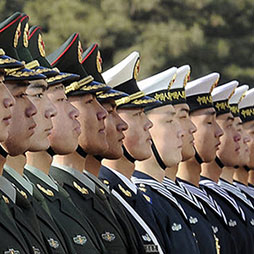Book from the People's Liberation Army Conference
Lumbering toward the China Dream: The PLA’s Strategic Mission Through 2049 and Beyond
This chapter assesses the primary threats to the “China dream,” considers Chinese leaders’ plans to manage these threats, and concludes that the role of the People’s Liberation Army (PLA) will center on modernization, deterrence, and non-war missions.
EXECUTIVE SUMMARY
MAIN ARGUMENT
The period from now through midcentury will be a critical one for Chinese leaders eager to ensure that the People’s Republic of China reaches its centenary in 2049. They have directed the PLA to focus on military modernization, deterrence, and support of the government’s efforts to incrementally change the status quo in China’s favor through non-war methods. Paradoxically, despite expanding security concerns, the military’s role in the coming decades will likely be fairly limited. Eager to minimize risks to the China dream, Chinese leaders have shown no interest in chancing a war with the U.S. over Taiwan. Knowing this, U.S. planners and decision-makers will need to consider coercion and gray-zone tactics as the principal Chinese military challenge in the near term and the deterrence of an attack on Taiwan as a long-term challenge.
POLICY IMPLICATIONS
- Taiwan will face an ongoing threat of Chinese coercion and gray-zone tactics through 2049. U.S. planners and decision-makers will need to focus on these challenges in the near term to midterm and find ways to reduce tensions between Taiwan and China.
- Although unlikely, a Chinese attack to compel Taiwan’s unification remains a long-term threat. U.S. planners might need to consider options to maintain a credible, sustainable deterrence posture near Taiwan that lasts decades. A smaller, lighter posture could prove more sustainable but runs a higher risk of battlefield failure in the event of hostilities.
- China’s reluctance to risk war with the U.S. over Taiwan opens opportunities for crisis management. If the U.S. and China can strengthen crisis-management mechanisms and reduce tensions, the risk of war could stay low.
Timothy R. Heath is a Senior International Defense Researcher at the RAND Corporation.



